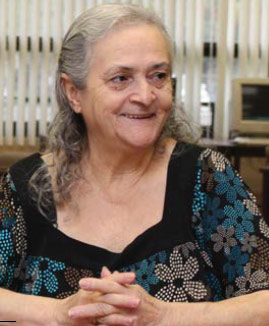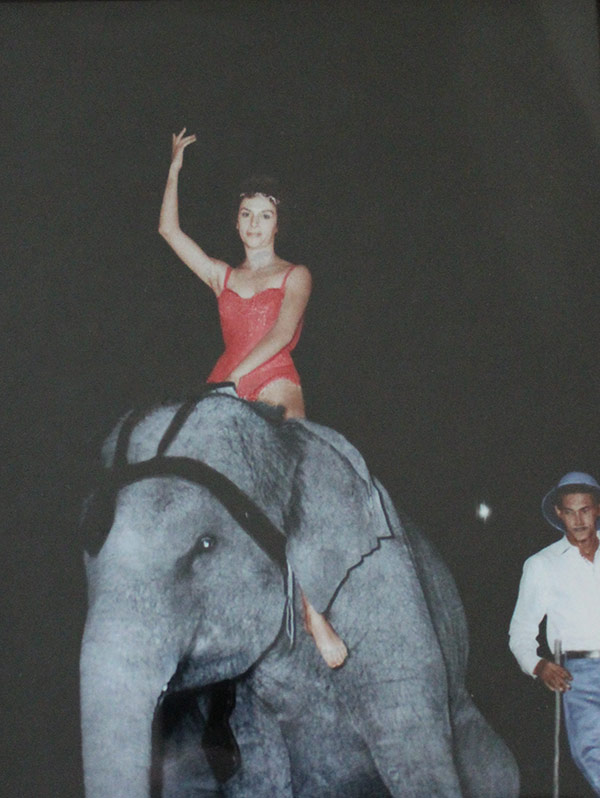
Seated among a lifetime of circus mementos, Graciella (Gracie) Quesada has lived for five years at Burlington Tower, a United Church Homes senior housing community in St. Petersburg, Florida.
As you’d expect from someone born and raised in a small town in rural Cuba, Gracie speaks fluent Spanish in a soft, melodic, lilting voice, while Julio Gonzalez, maintenance supervisor for Burlington Tower, serves as translator. She repeatedly says she needs to get back to Cuba. It is home. She remembers her life there with fondness. It dictates her view of the world.
Gracie was a circus performer in Cuba. Following in the footsteps of her sister (who literally fell in love with a clown), Gracie saw the circus as a way to earn good money. She worked with the elephants and was a tightrope walker, an aerialist. It was a sister act.
The circus, owned by the government, with Fidel Castro as president, also provided Gracie with the freedom to travel, moving all about Cuba via train—traveling, setting up, tearing down, moving on to the next venue. It was hard work, but came with pretty costumes. Gracie and her sister were the belles of a traveling circus.
Gracie recalled that her sister would hang from a rope by her teeth while Gracie climbed down her body and held onto her sibling’s feet, never afraid despite working without a net. When she first joined the circus, Gracie would hang upside-down on a trapeze by her feet, while someone would spin her until she became woozy, wobbly and dizzy. She learned to be brave.
 She also worked with the elephants every day, riding above their heads. Elephants, she says, are temperamental creatures, occasionally inclined to be uncooperative. They often knocked the girls down, unaware that they were even doing so. The circus girls made this part of the act, lying still while the elephants stepped over them, all to entertain the crowds. Gracie was grateful she was never trampled, knowing that any elephant could easily crush her.
She also worked with the elephants every day, riding above their heads. Elephants, she says, are temperamental creatures, occasionally inclined to be uncooperative. They often knocked the girls down, unaware that they were even doing so. The circus girls made this part of the act, lying still while the elephants stepped over them, all to entertain the crowds. Gracie was grateful she was never trampled, knowing that any elephant could easily crush her.
Gracie recalls the elephants with affection. “It’s true that elephants never forget,” she affirms. Once she left the circus for a spell to travel with her family. When she returned, an elephant remembered her and showed his joy by noisily trumpeting with his trunk, and gingerly touching her face.
Gracie stayed with the circus until she got married and started having children. The circus was certainly no place(s) to raise a family.
She came of age at a time U.S.A.-Cuban relations were strained, ultimately coming to Florida in 1980 to follow an adult son from Cuba. “Una madre nunca abandona a su hijo, (A mother never leaves her child)”, says Gracie. She knew her decision to emigrate would mean a less glamorous life than what she left, working at housekeeping in various hotels just so her family could exist. She’s now a U.S. citizen, but her children are all grown now and she misses the world she left behind.
Her sister still lives in Cuba, rich in its unique culture and music. While Gracie loves living with the friends she’s made at Burlington Tower, she still harbors dreams of Cuba. She’s still homesick. She wants to return home someday.
“I don’t care if my plane lands and I die as soon as my feet touch the earth,” smiles Gracie. “I want to go home and die happy there.” But Gracie will most likely never get to go home. She’s got a passport and the proper paperwork, but cannot afford the airfare. Her love for Cuba runs true and deep. She misses her homeland. Her feelings are heart-felt.
At United Church Homes we believe a sense of belonging is important to the wellness of our residents. While Gracie is enveloped in the Burlington Tower community, her heart is somewhere else—in Cuba. She wants to reconnect to the land she remembers so fondly. And lives with hope and determination that she will one day return to where she began. Until then, we are happy to have her belong with us, sharing her amazing life—past, present and future.
